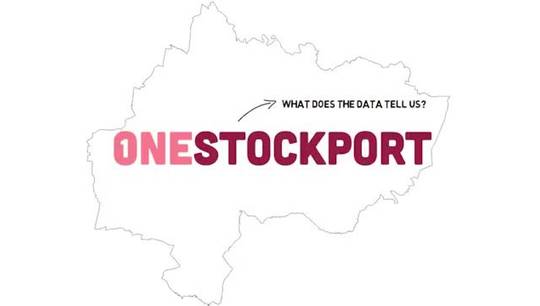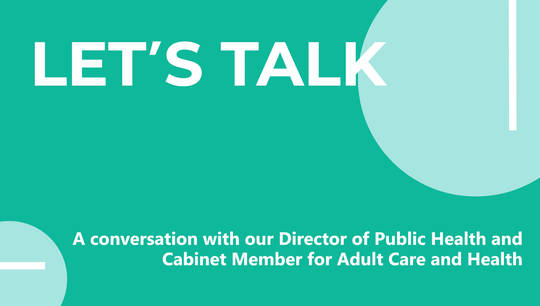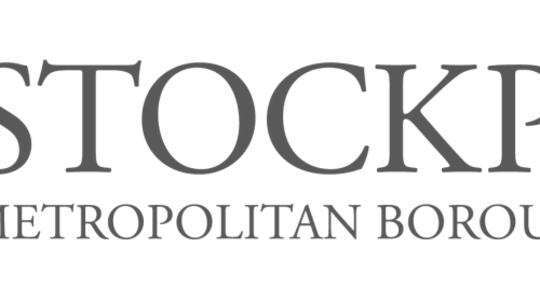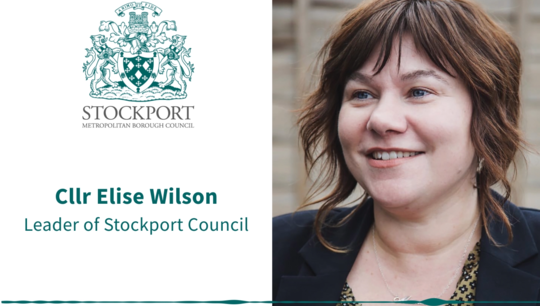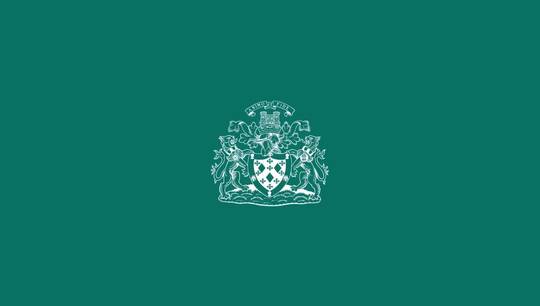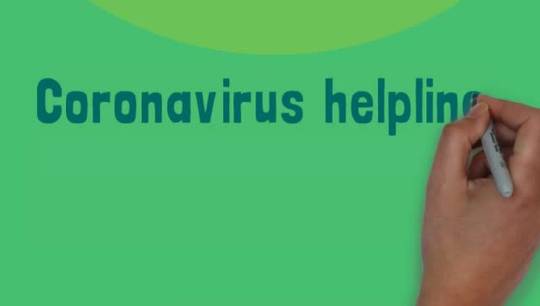COVID-19 Response
Stockport Council - Let's Talk
859 views
An accessible transcript is available below.
Timestamps:
Transcript:
QUESTION: At the time of recording, Heald Green East and Hazel Grove West had some of the highest infection rates in Greater Manchester. Have you been able to ascertain why that is, and has there been any targeted support to those areas and others with very high rates?
Jen Connolly, Director of Public Health for Stockport Council: I’ve no evidence of the Brazilian variant at this point but we are aware that the variant that originated in the South East does seem to have been spreading in Stockport as it has been across the country and Greater Manchester. We get some information about the likely spread and that does seem to be rising week on week in the last few weeks. As we might expect the next couple of weeks, I anticipate that becoming the dominant variant as we will probably see across a lot of the country because it’s more readily transmissible which does seem to give it an advantage in that sense.
We don’t have a specific figure. We’ve got some information to go off that puts it in that range. I imagine it might even be slightly higher at this point because time has moved on.
We see a bit of variation week on week around the Borough. We have cases across all of the wards in the Boroughs. On a week on week basis that picture of which areas are the very highest does change, almost daily if you look at the data. It’s also influenced by the fact that those levels, the MSOA’s Medium Super Output Areas, they’re quite small numbers. Small number changes in that population can then translate to quite a high rate per 100,000. Where areas are higher, it tends to be either in relation to specific outbreaks, or where there are potentially several households where a few members of the same household have tested positive all on the same day or within the same few days. That can then quite directly influence what we’ve seen in the particular wards. There’s been nothing exceptionally in what I’ve just described going in there. Obviously, we pay attention to anything like that and do try and understand it a little bit more so there’s nothing beyond what I’ve just set out that we’re aware of in those particular areas.
Cllr Jude Wells, Cabinet Member for Adult Social Care and Health:
You’ll see that all the time there’s been variations across the wards and there’s no particular pattern emerging. What we’ve got is a very proactive service going out. The Pandemic Response Team are working in communities. For example, before Christmas we had a particular issue on one community and, when we were allowed to, we went out and did some very active engagement with the public around the rules, etc. So, what we’ve done within the confines of the rules in which we’re operating now that lockdown imposes restrictions on our workers, is what we’ve done all along which is really engage with community leaders, with businesses in the area to really work closely in terms of that proactive response. The key messages which we all know about are the thing that will help us in terms of that engagement. As Jen said, it’s often small family groups where the numbers are spiking. We have had variations across the geographical patches and every area has live cases at the moment, so we are taking a Borough wide response but with targeted approaches in terms of the outbreak management when we’ve needed to.
Q: Statistics show that cases are highest among the younger age groups - the over 15s to under 65s. On January 8 one in every 20-24 year-old in Stockport was positive for coronavirus according to the government dashboard. Is this purely down to people in these groups flouting the rules, or are there other factors that make this demographic more vulnerable to catching the virus.
Jen Connolly:
I would say on average most weeks we see around a third of our cases related to transmission within households. It’s important for people to remember, where it is possible, within a household if someone does test positive trying to do things to reduce the likelihood of transmission within your household can be really effective. Sleeping in separate rooms if possible, not eating at the same time, being sure to clean bathrooms and kitchens between people using them and keeping the space well ventilated by opening windows and doors on regular occasions, can really help reduce the risk of transmissions within the households. It’s just another point for people to be aware of.
We’ve seen over the last few weeks the rates have been highest in our 18-30-year olds and then in our 30-50-year olds so very much the adult working age population. We know from insight and intelligence work that compliance is actually really high so in the vast majority it’s not people flouting the rules. People are working really hard to adhere to those rules wherever possible. Obviously, some groups of people are still having to be in face to face work and that may put them at a slightly higher risk because they have to work where others are able to stay at home or they are having to use public transport or other things that may be a contributing factor. But broadly people are really keen to and are really doing well at following the rules so I think that’s quite important to note.
I think also for those frontline workforces that are having to operate through the lockdown, we’re rolling out our targeted testing at scale offer across those workforces. We’re going live with testing by supporting the different settings to set themselves up with testing in the work place wherever possible so that we can make it as easy and convenient for people to get tested on a regular basis because that makes us a bit more sure about the validity of that testing to have it done as a routine regular test within the work place.
Q: According to a survey presented by Andy Burnham at his press conference last week 8% of people do not feel their workplace is Covid-safe. Some 28% said this was due to a lack of social distancing and others complained of inadequate sick pay for those having to isolate.
How concerned are you about the role workplaces may be playing in the spread of Covid-19 in Stockport? Is enough support in place for those who need to isolate/shield or even take time off for a test?
Jen Connolly:
I think it’s a really good question to be considering are we doing all we can to support the work places and we’ve seen a phenomenal response from Stockport businesses. We had a webinar with some last week, we’re in constant dialogue with them through our Economic Resilience Forum about what more we can do to support. Whenever we do become aware of an outbreak we work with that organisation to support them with the risk assessment and to help them understand and interpret the guidance around close contacts to make sure people are then supported to isolate if they’re identified as a close contact and we can hold an outbreak control meeting with those work places if they’ve got concerns or we want to explore anything together to make sure we are giving them all the support we possibly can to help manage those.
But more importantly we work closely to try and think about the preventative actions that work places and businesses can be taking. We’ve been sharing that insight of working with workplaces and businesses wherever possible to share those tips and those measures people have found quite useful. Above and beyond just thinking about the application and the guidance but thinking about the behaviours that underpin those guidance’s being effective. It goes back to the messages that we share with the general public; social distancing is really important. This is a respiratory virus that spreads through droplets so keeping your distance from each other is really important. Wearing your face covering where it’s appropriate and washing your hands regularly and cleaning services, those messages are the same whether you’re in work or out of work and they are the things we encourage everybody to adhere to.
Cllr Wells:
Certainly, as a cabinet we are very conscious that we need to support individuals but also businesses in terms of helping people to work from home which is safer for the majority of people but not feasible for folk as Jen’s outlined. We’re reminding people that furlough is still available to people and we need to be promoting the fact that that’s there to support the clinically vulnerable and people who are at high risk. There are obviously people who can be eligible for a grant and can be furloughed so we’re basically reinforcing a lot of the messages from previous lockdowns because that often gets forgotten so what we’re trying to do is reach out in a very proactive way with businesses to promote that message is we’re just demystifying some of the rules around the furlough scheme which means that you can be furloughed for child care reasons and to look after someone if you’re a carer.
Certainly, we’ve done a lot of work with our sector in terms of the care homes and care providers to support people being furloughed, isolating when they need to, using the infection control funds that we’ve had the benefit of receiving and we’re using that I a very proactive way to support that at risk and vulnerable workforce to isolate and be supported when they need not to be in work. One of the other things that we are promoting is the fact that people do need to have regular tests. One of the things that Jen’s mentioned is the really positive news about the lateral flow testing and that targeted support which will be live from this week and also the issue of actually enabling people to go for tests and reminding employers it’s their duty of care as an employer to support workers who need to go for tests and take that time off. So, what we’re doing is reinforcing what the messages are, looking use of things like the discretionary grant, there are some limitations in some of the funds which you’ll be aware of that are the national funds available for us to use for people and we’ve been really proactive at processing the discretionary grant scheme and also the awards, but they are not allowed to be used for wages, they are only allowed to be used for things like rent etc.
Q: There are five vaccination centres in Stockport and residents in priority groups may also be invited to the ‘super-vaccination centre’ at the Etihad stadium.
Jen Connolly:
I’m delighted to talk about vaccinations because what a positive step and it’s just fantastic that we have this fantastic development ready for us at this point. The vaccination is led by the NHS across the country and the main route is through GP practices. They come together on a footprint called the Primary Care Network to deliver within the community. We’ve got seven of those across Stockport and they’re all up and running and vaccinating throughout this week and over the weekend. To supplement all of that we have some slots available at the Etihad Stadium as part of the Greater Manchester mass vaccination site so there are those three routes that people might be invited for vaccination. It’s important to remind people that you’ll be invited but if you haven’t heard you don’t need to at this stage contact your GP. When it is your turn you will be contacted by your GP to be invited for the vaccination and we really encourage people to take up that offer as soon as it is made available to you. It’s such an important tool in reducing the risk for people going forwards. So, it’s great to have the vaccine offer and the roll out is going really well across Stockport. GPs have done a phenomenal job and have delivered all vaccine that has been made available to them.
Cllr Wells:
The way that the health teams have stepped up to deliver the vaccines, as Jen said when they arrive, they’re out delivering 7 days a week. We’ve had such positive feedback from the community about the way that it’s being deployed in Stockport, so I’d like to give a personal thanks for everybody’s work so far. Without exception it’s been fantastic, and it’s run really smoothly. The amount of feedback we’ve had is phenomenal. And I thank people for going and having the jab because that’s the way that we can protect ourselves and each other so all in all incredibly positive numbers of people are going out. The voluntary drivers’ scheme as you’ll see on Twitter is really making a difference in taking the people to the sessions when they need their injections so fantastic stuff and thanks to colleagues in health who are making this happen in Stockport. We’re very lucky to have fantastic teams locally who are pulling out all the stops to do this. We’ve got some challenging targets around care homes and care staff but we’re really on track to deliver those to the time frames that have been set so fantastic news altogether.
Q: Some areas of Greater Manchester - including Trafford and Rochdale - have reported some vaccine supply issues. Has this been the case in Stockport and are you confident all the borough’s priority groups will be vaccinated by the February 15 deadline?
Jen Connolly:
As I say we haven’t had any major supply issues in Stockport and the GPs and associated teams have been vaccinating, 100% in terms of deliveries. They’ve been working at pace to get as much as they possibly can do done.
Q: The arrival of a third lockdown will have had a serious impact on mental health. What is being done to address this issue in Stockport and ensure people are getting the timely support they need?
Cllr Wells:
From March onwards we were very conscious that the impact that self-isolation, people staying at home, children staying off school, etc. would have quite negative effects on people’s wellbeing and their mental wellbeing and certainly we pulled out all the stops to reshape some of the services that were already available to people. We did a lot of work on communication in terms of all the fantastic voluntary sector groups that are out there to reach people. CCG commissioned a safe haven for people in terms of that immediate mental health support. Obviously, we’ve got groups like the Samaritans who have been fantastic partners in Stockport but certainly as time has gone on, we’re much more conscious of the need to reframe and refocus that and at the last scrutiny meeting we had a very detailed discussion about mental health, and could we be doing more and what are the issues going forward because this may have long-term impacts on people’s wellbeing. So, certainly at the January scrutiny there is a report coming from the team to outline our current offer and think about what we need going forward, but I think our information and communication about the service that are available to people is very robust. One thing which is always an issue is are we assuring ourselves that the people who need that support, it’s reaching them in a timely manner. So that’s my information there in terms of our offer but be assured that we are paying very detailed attention to that area because we know the pandemic is having a massive effect on people’s wellbeing.
Jen Connolly:
We’ve got lots of resources available on our website. Please have a look at those. We did include all of that information about the different sources of support in the letter we sent to all residents in September and that information is still absolutely valid it’s all on the website as well so that people can access that. We are understandably concerned and will keep that front and centre of everything we do. We’ve always had the coronavirus safety messages very much alongside those mental wellbeing messages as well because recognise the importance there. We’ve done a lot of work through our communities programme and will continue that work as well to make sure we are getting those messages out in different forums with different messages but the same core offer of what support is available if people need to reach out for that additional support. I’ll just say that all we can do to get the rates down in the community contribute to the maintenance of all essential health services and we very much encourage people to still seek support for any health needs. The NHS are doing a phenomenal job of supporting everybody at this time and so I thinks it’s still important that people do reach out for the support they might need for any health concerns. The quicker we can get the rates down the better for all concerned in terms of the maintenance of those NHS services going forward.
Just to add, if anybody does need any support in the way that Cllr Wells has outlined our coronavirus helpline is 0161 217 6046 so please do contact us if you need any help with those sorts of activities.
